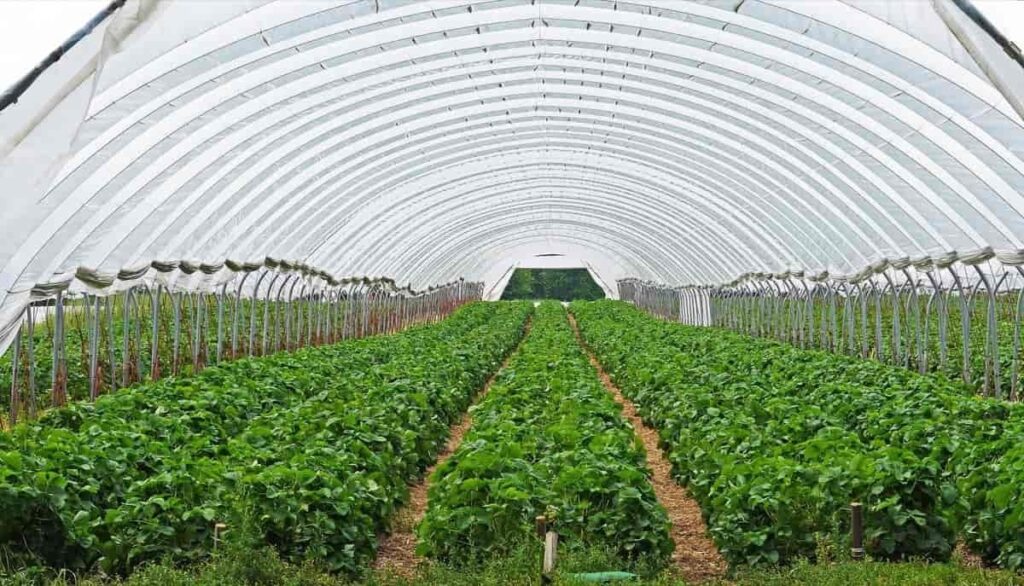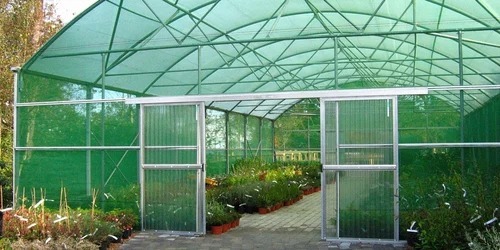In the age of smart farming, urban farming, and sustainability, polyhouse farming stands out as a revolutionary solution. This method of protected cultivation involves growing crops inside controlled, transparent structures made of polyethylene plastic. By offering a shield from extreme weather, pests, and diseases, polyhouses create the perfect environment for year-round crop production, even in challenging climates.

What is Polyhouse Farming?
Polyhouse farming, often referred to as protected cultivation, involves growing crops in a controlled environment created using transparent plastic covers, typically made of polyethylene. This controlled environment allows for year-round cultivation, even in extreme weather conditions. The structure itself acts as a greenhouse, where factors like temperature, humidity, light, and soil conditions can be optimized for better crop yield.

Why Choose Polyhouse Farming?
1. Maximised Yields: Polyhouses provide an ideal environment for crops to thrive. With controlled temperature, humidity, and light, farmers can grow high-value crops like tomatoes, cucumbers, and herbs faster and with higher productivity.
2. Water Conservation: With increasing water scarcity, polyhouses are a water-efficient choice. By reducing evaporation and optimising irrigation systems like drip irrigation, polyhouses help conserve water, making them an eco-friendly option
3. Urban Farming: Polyhouse farming is perfect for urban agriculture, allowing city dwellers to grow fresh, local produce even in limited spaces. Whether on rooftops, vacant lots, or community gardens, polyhouses enable urban farming to flourish.
4. Sustainability: As the world embraces sustainable farming practices, polyhouse farming offers a smart solution. It reduces the need for chemical pesticides, minimises water usage, and maximises land productivity, contributing to both food security and environmental conservation.
5. Weather Protection: Polyhouses shield crops from extreme weather like heat, rain frost, and wind, ensuring healthy growth in unpredictable climates.
6. Pest & Disease Control: The enclosed structure protects crops from pests and reduces the need for pesticides, promoting healthier, chemical-free crops.
7. Extended Growing Seasons: Polyhouses allow for year-round cultivation, enabling off-season crops and higher production, regardless of climate conditions
Types of Polyhouses:
Polyhouses come in various designs, each suitable for different kinds of crops and climates. The main types include:
- Naturally Ventilated Polyhouse: This design is ideal for areas with moderate climates. It relies on natural airflow to regulate temperature and humidity.
- Fan and Pad Polyhouse: This system is best suited for areas with high temperatures. It uses fans and wet pads to cool the air inside the polyhouse, ensuring crops grow in a stable environment.
- NFT (Nutrient Film Technique) Polyhouse: A hydroponic system where plants are grown in a thin film of water enriched with nutrients. It’s ideal for high-value crops like tomatoes, peppers, and herbs.
- Single Arch Polyhouse: A simpler, cost-effective structure with a single arch design, perfect for smaller-scale farming or niche crops.

Sustainability in Polyhouse Farming
Polyhouse farming uses resources efficiently, reducing water waste and chemical use. It supports organic farming and can integrate solar energy to further enhance sustainability.
Challenges of Polyhouse Farming
- Initial Investment: Setting up a polyhouse requires significant capital, though higher yields can offset costs.
- Technical Expertise: Managing a polyhouse requires knowledge in climate control, irrigation, and maintenance.
- Ongoing Maintenance: Regular checks are essential for temperature, humidity, and structural integrity.
The Future of Polyhouse Farming
With the integration of smart technology—like automated irrigation, climate control systems, and sensors—polyhouse farming is becoming more efficient and accessible. It’s a game-changer for small-scale farmers, urban gardeners, and anyone interested in growing fresh produce sustainably.
In conclusion, polyhouse farming is more than just an agricultural trend—it’s the future of smart, urban, and sustainable farming. OrgaAyur productions promote urban farming and provide different agriculture services such as poly house farming with user friendly and cost friendly Ready to embrace the future of food production? Start your polyhouse journey today! 🌱
